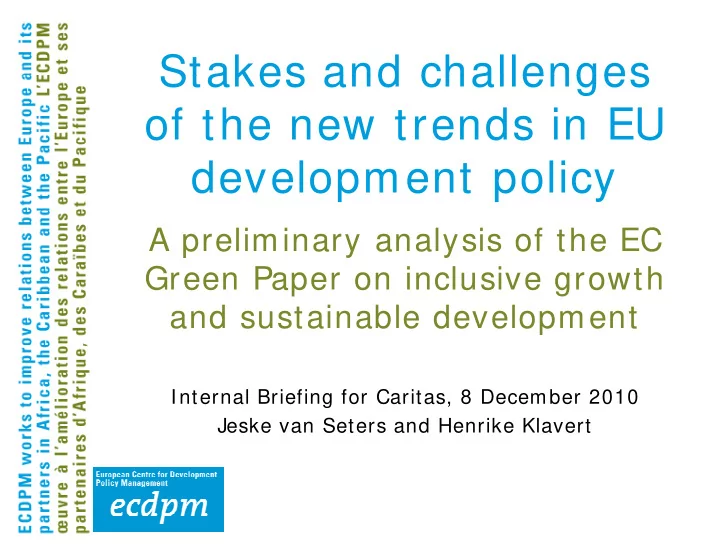

Stakes and challenges Stakes and challenges of the new trends in EU development policy A preliminary analysis of the EC Green Paper on inclusive growth Green Paper on inclusive growth and sustainable development Internal Briefing for Caritas, 8 December 2010 Jeske van Seters and Henrike Klavert
What is ECDPM? What is ECDPM? • • Non-partisan foundation created in 1986 Non-partisan foundation created in 1986 • Aim: Improve relations between EU and ACP • Focus of our work: Focus of our work: Non-partisan facilitation of dialogue between Europe and Africa Policy-based research and analysis Strategic partnerships with governmental and non-governmental organisations d t l i ti • Funding: Institutional funding by 9 EU MS + Switzerland + project funds from other Switzerland, + project funds from other sources Page 2
Challenges ahead Challenges ahead • • EU sliding into global irrelevance? EU sliding into global irrelevance? • ODA spending under pressure, 0.7% unlikely to happen by 2015 y pp y • Governments stretching the definition of ODA • Global development challenges cannot be addressed with aid alone • • Need to think about post MDG world Need to think about post-MDG world Page 3
Background to the Green Paper Background to the Green Paper • • Shifting development paradigm Shifting development paradigm • Lisbon: priorities as in Europe 2020 • Financial crisis: Pressure from the public Financial crisis: Pressure from the public • New Commissioner • Various other consultations/ policy / p y proposals: Budget Support, funding for EU external action, 10 th EDF Performance Review CAP Reform 10 th EDF Performance Review, CAP Reform, Europe Energy 2050 Page 4
Green Paper: start of a process Green Paper: start of a process • October 2011 Communication on October 2011 Communication on modernisation of EU development policy • Review of the European Consensus on Development? • New Multi annual EU Financial Framework (budget) 2014 – 2020 Page 5
Trends in the Green Paper Trends in the Green Paper • • Emphasis on results and impact Emphasis on results and impact • Focus on inclusive growth & private sector development p • Aid as a catalyst, innovative sources of financing, end of “traditional” instruments • Priorities: climate change, renewable energy and agriculture/ food security Page 6
(1) Focus on inclusive growth & private sector development Opportunities: pp • Moving beyond the MDG agenda • Working with private sector for development • Demonstrate value of development cooperation to European citizens Risks: • Not getting the aid–inclusive growth g g g paradigm right? • Support for social sectors falling off the agenda? d ? • Moving back to tied aid? • European Commission capable of getting the European Commission capable of getting the instruments right? Page 7
(2) Aid as a catalyst – innovative sources of funding Opportunity: Opportunity: Additional resources to promote development – aid alone is not enough g Risks: • Lower ODA ambitions or way to inflate ODA figures? Blending of loans and grants � debt t � d bt • Bl di f l d problems? • • Less support that does not directly leverage Less support that does not directly leverage other sources of funding? (e.g. human rights, democracy) Page 8
(3) New priorities: climate change renewable energy and change, renewable energy and agriculture/ food security Opportunities: • Better address global challenges • Prioritisation – instead of trying to do it all Risks: i k • Instrumentalisation of development aid? • Policy Coherence for Development –lack of Policy Coherence for Development lack of conviction? Page 9
Missing in the Green Paper: who does what? • Importance of EU coordination and Division of Labour highlighted g g • But what will Commission do as compared to member states? • H How do EEAS and DEVCO work together? d EEAS d DEVCO k t th ? • And how will Commission and European And how will Commission and European Investment Bank collaborate? Page 10
Missing in the Green Paper Missing in the Green Paper • Political economy analysis - What incentives and structures can explain current policy policy – implementation gap? implementation gap? • Refined actor analysis - How to work with private sector, CSOs to implement the new approach? • Role political dialogue to create alliances to further common interests • Challenge of delivery capacity Page 11
Caritas & the consultation process Caritas & the consultation process • What contribution can Caritas make to the thinking on the future of EU development g p policy, based on its values, experience and knowledge? • What can Caritas learn from the new directions in EU development policy? directions in EU development policy? Page 12
Thank you y www.ecdpm.org Jeske van Seters Jeske van Seters jvs@ecdpm.org H Henrike Klavert ik Kl t hk@ecdpm.org These are initial first thoughts - ECDPM ECDPM will be working more on the ill b ki h Green Paper and refining its analysis Page 13
Recommend
More recommend